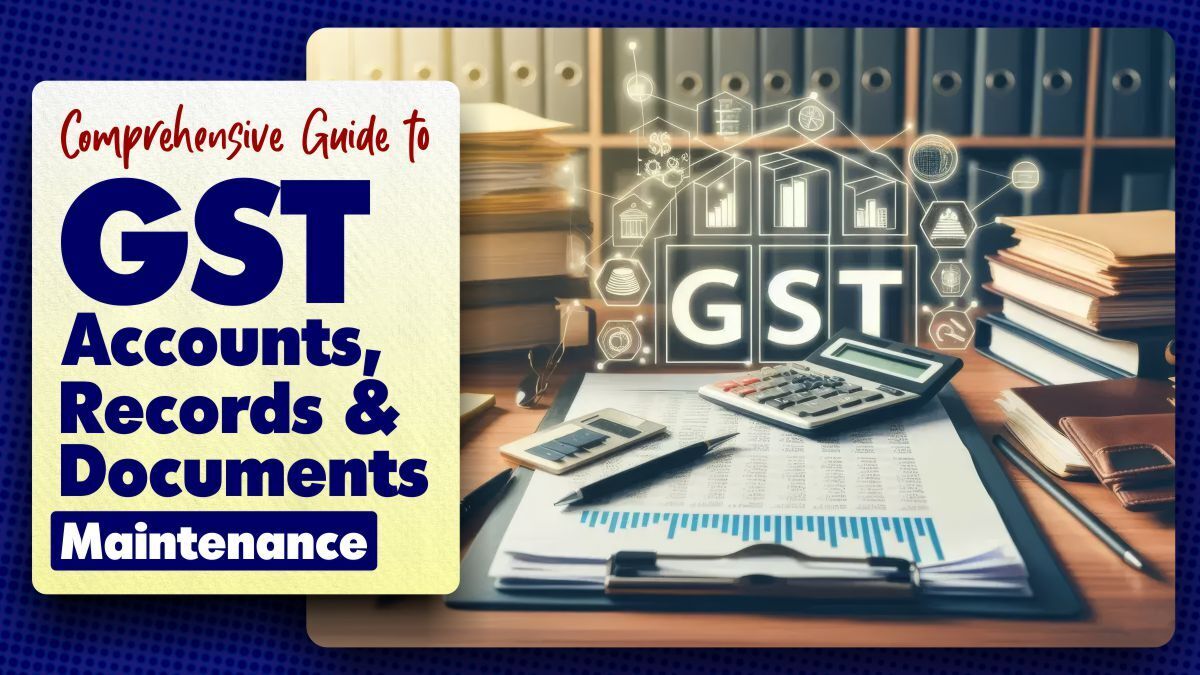
Maintaining accurate and comprehensive accounts, records, and documents is a critical requirement under the Goods and Services Tax (GST) Act for every registered person. This guide provides an in-depth look at the records that need to be maintained, tailored for GST compliance.
12 Key Records and Documents for GST Compliance
Under the GST Act, every registered person is required to maintain the following records and documents:
1. Details of Production or Manufacture of Goods – Includes comprehensive records of the production process, from raw materials to finished products.
2. Inward and Outward Supply of Goods or Services – This covers all transactions related to the purchase and sale of goods and services.
3. Account of Advances – Maintain separate records of advances received, paid, and the adjustments made.
4. Stock of Goods – Detailed stock records, including inventory counts and valuation.
5. Quantitative Details of Raw Materials and Manufactured Goods – Record quantitative details of raw materials used and the goods produced, including waste and by-products.
6. Tax Invoices and Financial Documents – Keep tax invoices, bills of supply, delivery challans, credit notes, debit notes, and various vouchers.
7. Proof of Receipt and Dispatch of Goods – Documents such as Lorry Receipts (LR), Goods Received Notes (GRN), and E-Way bills.
8. Input Tax Credit and Output Tax – Details of input tax credit availed and output tax payable and paid.
9. Supplier and Customer Information – Names and addresses of suppliers and customers.
10. Details of Imported or Exported Goods – Records of goods or services imported or exported and supplies attracting reverse charge tax.
11. Quantitative Details of Goods Used in Services –Details of goods and services used in provision and supply of services.
12. Storage Information –Addresses of all premises where goods are stored.
Special Requirements for Works Contract Service Providers

For those executing works contract services, additional records must be maintained:
- Names and addresses of persons on whose behalf the works contract is executed.
- Details of goods or services received and utilized in the execution of works contract.
- Payment details for each works contract.
- Supplier details from whom goods or services were received.
Additional Records for Godown/Warehouse Operators and Transporters
For Transporters:
Maintain records of transported, delivered, and stored goods in transit, along with GST numbers of consignors and consignees.
For Warehouse Operators:
Maintain books of accounts for the period goods remain in the warehouse, including dispatch, movement, receipt, and disposal.
Store goods in a manner that allows item-wise and owner-wise identification and facilitates physical verification.
Additional Records for Agents
Agents must maintain:
Particulars of authorization from principals for receiving or supplying goods or services.
Detailed records of goods or services received/supplied on behalf of each principal.
Accounts furnished to each principal.
Tax paid on receipts or supply of goods/services on behalf of each principal.
Storage and Maintenance of Records
Records must be stored at the registered principal place of business. For additional places of business, records should be kept at those locations. If records are voluminous, they can be stored at an external storage facility, provided it is registered as an additional place of business and the jurisdictional officer is informed.
Retention Period for Records
Records must be retained for 72 months (6 years) from the due date of the annual return for that period. For example, records for June 2017 to March 2018 must be kept until June 2025. If involved in any legal proceedings, records must be retained for one year after the final disposal or for the specified period, whichever is later.
Electronic/Digitized Records Maintenance
Records can be maintained in physical or electronic/digitized format, authenticated by a digital signature as per the Information Technology Act, 2000. Proper electronic backups should be maintained to ensure information can be restored if destroyed. Details of electronic files and passwords must be provided to officials upon request.
Conclusion
Maintaining comprehensive and accurate records under the GST Act is crucial for compliance and smooth business operations. Following these guidelines ensures you meet all legal requirements and avoid potential penalties./p>
Formulated by:
N J Jain & Associates, Chartered Accountants
CA Nitesh Jain (Managing Partner)
CA Gaurav Khetan (Partner)
CA Praveen Maheshwari (Partner)
CA Jay Dalwadi (Partner)

